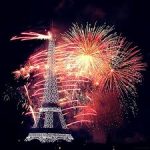If you are in France this weekend, you might wonder what is going on –the roads leading to the south of France are jammed with cars, campers and some small RVs, Paris seems to be less crowded, and perhaps your favorite little café is closed.
Voilà pourquoi: Monday is la fête nationale, or le Quatorze Juillet, in France. (It seems that only English speakers refer to the day as Bastille Day)
In 1789, French commoners – bourgeois and peasant alike – were in the midst of breaking away from the monarchy and establishing a constitution. On July 14, 1789 Parisians were afraid that they would be attacked by the royal military and were looking for arms and gunpowder. Both were stored at the Bastille, a fortress like prison in Paris, which also held political prisoners. The crowd overwhelmed the guards, released the seven political prisoners, killed the warden, and stole the guns and gunpowder. Soon afterwards, in August 1789, feudalism was abolished, the Ancien Régime was finished, and France was on its way to becoming a Republic, although it took a few more monarchs and emperors before a Republic was born.
The French have commemorated July 14 since 1790. In 1880, July 14 was officially
declared France’s national holiday: la fête nationale.
Official celebrations of July 14 includes the Défilé du 14 juillet, or Military Parade, that has been held in Paris since 1880. Since 1918, with the exception of the German occupation years, this parade has descended the Champs Elysées, from the Arc de Triomphe to the Place de la Concorde. Over 7,000 soldiers march in the parade, including cadets from various military schools, as well as 240 horses, 300 vehicles and tanks, and more than 80 planes and helicopters. The famous Patrouille de France, the French Air Force’s precision flying team, soars over the Arc de Triomphe and the crowd trailing blue, white and red contrails. The President of the French Republic reviews the troops in an open Jeep before joining his guests at the reviewing area in the Place de la Concorde. In the past several years, groups from other countries have been a part of the parade, most notably members of the French Foreign Legion, Malian soldiers, and the Entente Cordiale, from Great Britain.
Throughout the country, French people celebrate with Fireman’s balls, street festivals, dances, and other fun events. In many cities, some museums are free. And there are fireworks! In Paris, the fireworks display is at the Trocadéro, across the Seine from the Eiffel Tower. Crowds gather to watch the show on the Champ de Mars that stretches out behind the Tower, as well as on boats in the Seine.
In the United States, there are July 14th festivities in over fifty cities, including Baltimore, Chicago, Minneapolis, Sacramento, and Saint Louis. Naturally, New Orleans has a party in the French Quarter, while in Philadelphia there is a reenactment of the storming of the Bastille, held at the Eastern State Penitentiary.
So, no matter where you are, on Monday July 14, you can celebrate French Independence Day with a baguette, a glass of wine, and maybe participating in an event held in your town.
Bonne fête!


Leave a Reply